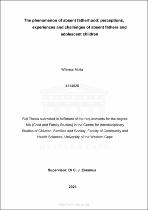| dc.contributor.advisor | Erasmus, Charlene | |
| dc.contributor.author | Moila, Witness | |
| dc.date.accessioned | 2023-11-13T11:11:34Z | |
| dc.date.available | 2023-11-13T11:11:34Z | |
| dc.date.issued | 2023 | |
| dc.identifier.uri | http://hdl.handle.net/11394/10529 | |
| dc.description | Magister Artium (Child and Family Studies) - MA(CFS) | en_US |
| dc.description.abstract | The escalating statistics of children who are growing up without the involvement of their fathers is a serious social problem not only in South Africa but globally. Statistics South Africa (Stats SA) (2021) indicates that 42% of children is South Africa live with their mothers only as compared to 4% of children who only live with their fathers. The statistics highlight the seriousness of the problem of absent fatherhood in South Africa. The study aimed to explore the perceptions, experiences and challenges of absent fathers and adolescent children regarding absent fatherhood. Bowen’s family systems theory was used as the theoretical framework underpinning this study. The study used a qualitative approach and an explorative and descriptive design. Collected data were analysed using Braun and Clarke’s (2006) steps of thematic data analysis, and the five themes which emerged were: perceived causes of absent fatherhood, constructions of fatherhood, factors influencing fathers’ absence, adolescents’ experiences of absent fatherhood and challenges faced by adolescents with absent fathers. | en_US |
| dc.language.iso | en | en_US |
| dc.publisher | University of the Western Cape | en_US |
| dc.subject | Absent Fatherhood | en_US |
| dc.subject | Bowen Family Systems Theory | en_US |
| dc.subject | Fatherhood | en_US |
| dc.subject | Adolescent Children | en_US |
| dc.subject | South Africa | en_US |
| dc.title | The phenomenon of absent fatherhood: Perceptions, experiences and challenges of absent fathers and adolescent children | en_US |
| dc.rights.holder | University of the Western Cape | en_US |

